#analysis and meta discussion
Text
Shipping is fun and all but I swear every single time someone makes a comment, whether as a joke or in a legitimate analysis, about there being "no other explanation" for a pair's interactions, I lose just a bit more of my sanity
Like, no, you guys don't get it. Romance is not about the Amount of devotion, it's about the COLOR. the FLAVOR of it all. a character can be just as devoted to their platonic friend as they are to their romantic partner, and they don't love either of them more, just differently.
But because the majority of people still have it stuck in their minds that romance exists on the highest tier of love, I'm stuck seeing endless takes that boil down to "these two care about each other too much for it to NOT be romantic" as if that's the core determining factor to how literally any of this works
In conclusion: stop telling me that I don't understand the story if I don't interpret the leads as romantic, I am TIRED
#analysis#meta#miscellaneous#fandom#shipping#media discussion#amatonormativity#lgbtq#I feel like tagging any of the fandoms I was thinking of when writing this would be a little mean-spirited potentially#Disclaimer: no one has actually been telling me personally that I don't understand any story in particular#It's just that the way people tend to phrase their analyses feels unnecessarily targeted at the reader and that's just. not great#even if I agree with every other point they make
20K notes
·
View notes
Text
Ciel does not see Sebastian as his father.
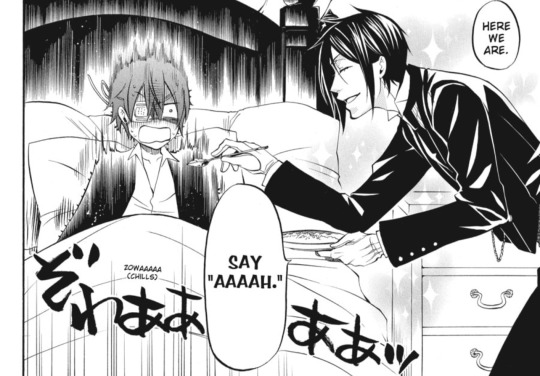
He is actively repulsed by the idea and Yana has shown this explicitly at least twice: once in the Circus Arc and again in the Murder Arc.
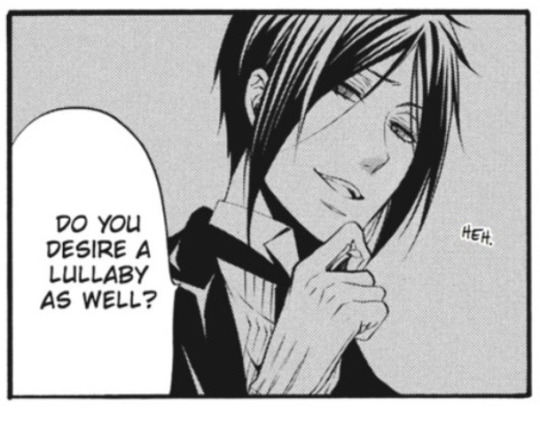

I know there’s a significant segment of the fandom who genuinely believes that Ciel wanted to have Sebastian to replace his dead father, but I disagree strongly, not only because of the above, but also because Yana has shown us that OC was much closer with Tanaka than Vincent.
Besides, if you look at the revisited contract scene from ch 138, it almost seems as if Ciel is not thinking of replacing Vincent when he makes the decision to accept Sebastian’s offer, but in fact is looking for a new protector to replace RC, his dead twin.
It’s impossible to talk about this moment without the gorgeous full-page series from the chapter.
Sebastian offers the contract. Ciel recalls his brother promising to protect him. He gazes out at his brother’s corpse and realizes that his only way forward now is through making a pact with the demon. His brother’s soul is gone already, as is his life.
So Ciel becomes his twin. He takes Sebastian on as his new shield for his revenge. Sebastian may be someone that Ciel relies on, but he is absolutely not his new father figure.
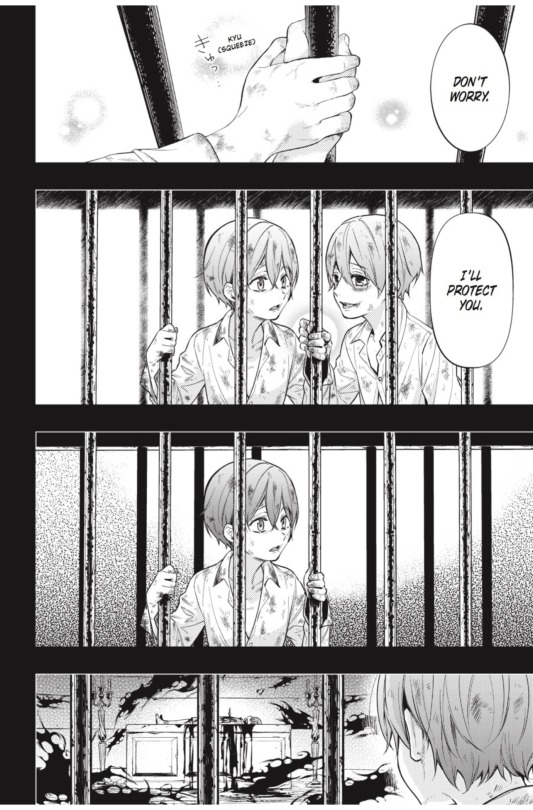
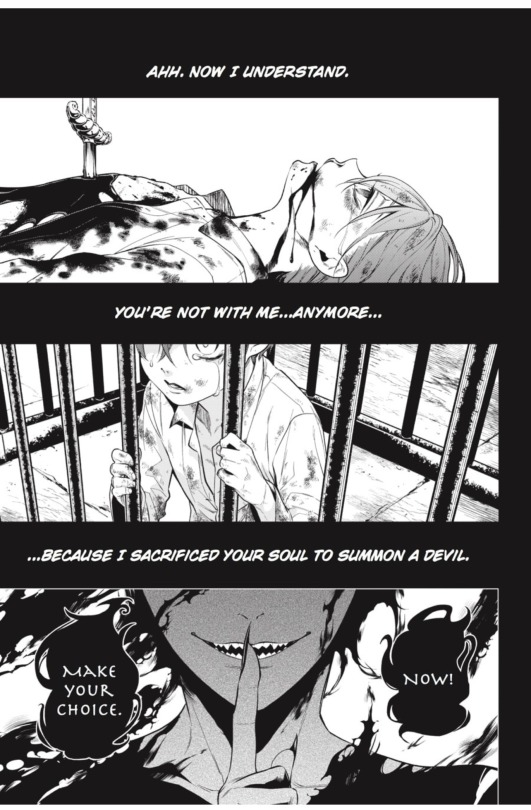
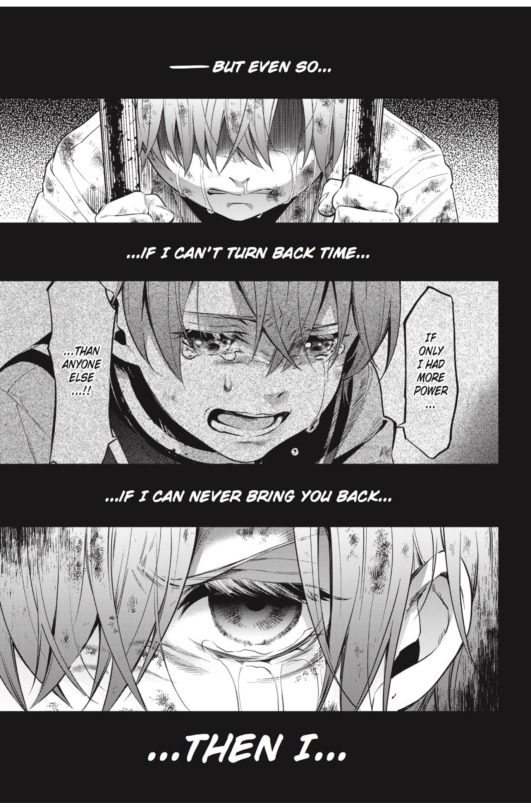
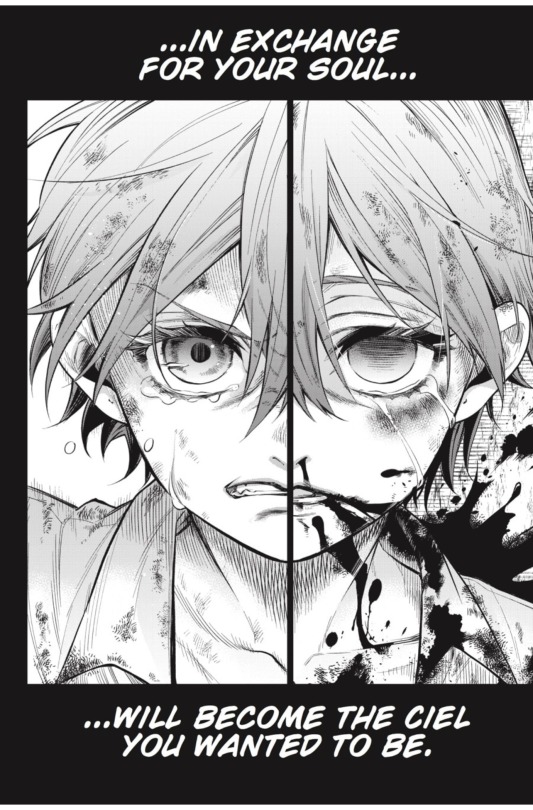
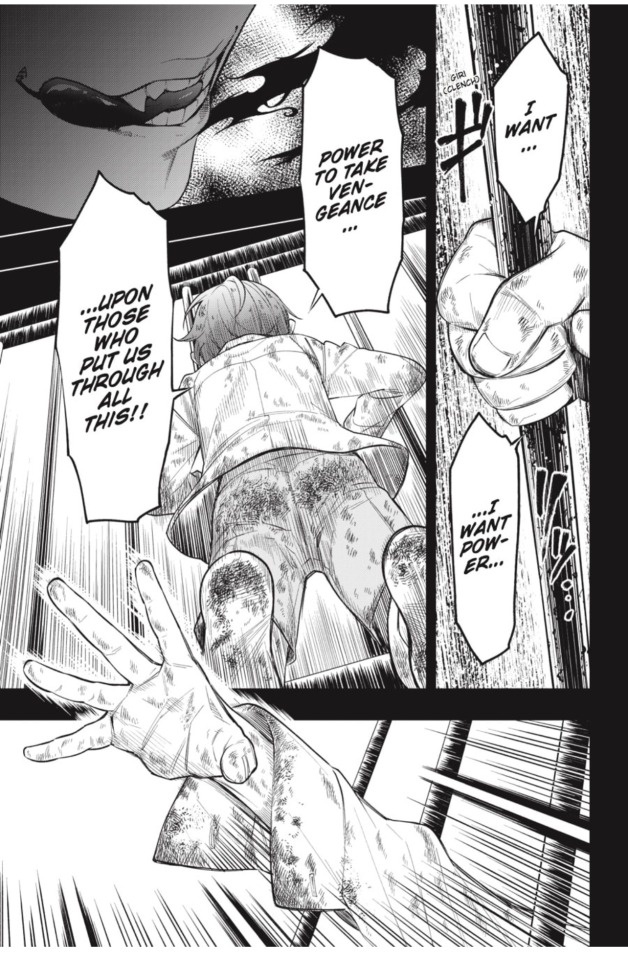
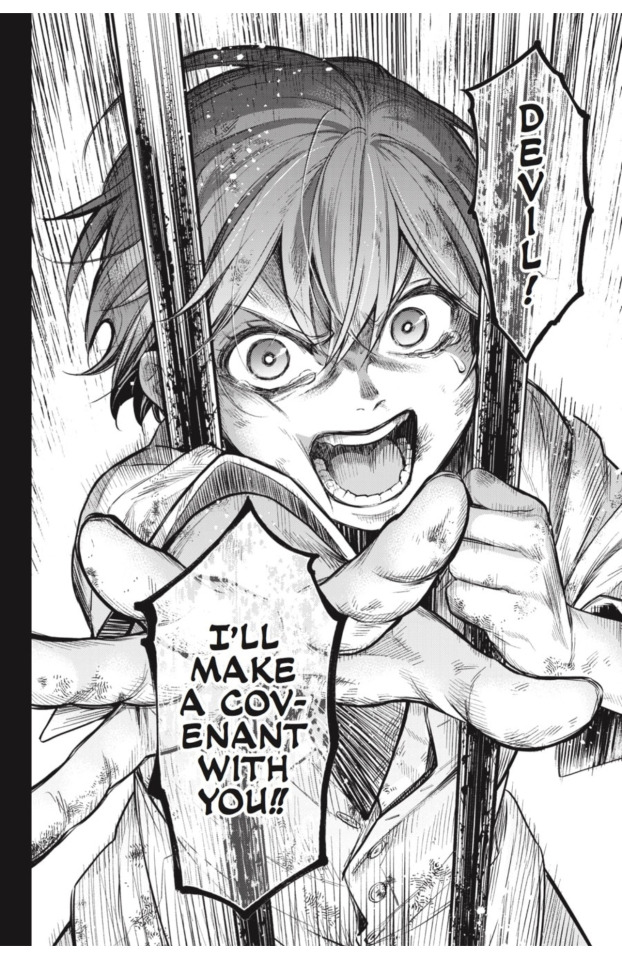
#black butler#黒執事#ch 138#book of circus#kuro meta#ch 41#ch 30#character analysis: ciel phantomhive#book of murder#ciel phantomhive#sebastian michaelis#real ciel#our ciel#antis dni#i’m open to discussing the topic if you can have a reasonable discussion#but if not you’ll be blocked#anti dadbastian#meta#poi og#100 notes
158 notes
·
View notes
Text
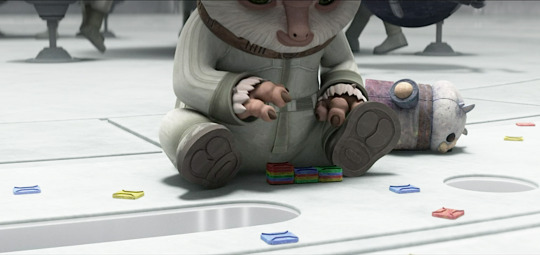



He's just a baby playing with blocks. Look how proud he is for stacking them so neatly. Look at the way he turns around for recognition, for someone else to get excited with him, to give him one of those big fake baby gasps and say 'good job!'.
He's just a baby. He doesn't understand what's going on. 😭
#The Filoni Era has been so good at giving us these little moments#that show us the Empire's evil wasn't all big bombastic figures in cloaks with magic powers#It was a cold and sterile evil#and somehow that feels worse#the bad batch#the bad batch spoilers#tbb spoilers#tbb season 3 spoilers#the bad batch season 3 spoilers#tbb season 3#sw tbb#the bad batch season 3#the bad batch meta#tbb meta#the bad batch discussion#tbb discussion#tbb analysis#tbb s3e13#Into the Breach#the bad batch analysis#tbb Bayrn#ADH-D2's Patented Bullshit
156 notes
·
View notes
Text
Lance Stroll Driving Style/Preference Analysis
I’ve seen a lot of videos and posts online about different driver’s driving styles, so I wanted to do a bit of in depth analysis for Lance since
I haven’t really seen a lot about his and
I think his is very interesting and differs from a large portion of rest of the grid
Disclaimer: I’m no expert or professional at this :)) It’s very much out of personal interest and looking at his growth as a driver. Be aware that styles can change depending on the car, and I could even argue that there are no true “styles”, which is why I like using the word “preferences” as well.
Introduction
Some things that I’ve seen being discussed when it comes to driver’s preferences include:
Early vs. late breaking into turns
Agressive vs. smooth steering
Preference of Understeer vs. oversteer
Just to name a few but it all plays a part in how fast you exit a corner, tire degradation, and possibility of getting overtaken.
Lance’s “Style”
On the grid, there are a lot of drivers who vary in their approach to how they take corners, such as Checo who always anticipates the best line to take, or Fernando who drives aggressively and uses a braking area to go into a corner without losing speed exiting it.
Lance differs because he’s always been a true reactive driver, meaning he relies more on instinctive feel. You can see it on his onboards, how he’s constantly adjusting the wheel and makes very erratic inputs while driving.
This is in contrast to other drivers who we see handle the steering wheel in a smoother way that doesn’t make it look like they’re wrestling with their car. In his first year of F1 especially, he was significantly overdriving the car.
He uses very deep braking and carries a lot of speed into the corner because of this. From the outside, it seems like he only plans up to the middle of the corner and somehow fights his way from there to the straight, but his reaction time is amazing, therefore he doesn’t completely lose the car. You can see how his approach is unorthodox.
Quali
If you’ve been following Lance for a bit, you probably know that quali has never been his strong suit, he’s definitely more of a Sunday driver. And this correlates directly to his style.
No two laps from him are exactly the same, and since it’s not very smooth, his one-lap pace suffers.
“Rainmaster”
Lance’s driving is far from ideal for a dry quali, but this is why he reacts very well to unforeseen events and changing conditions. On a wet track, drivers have to constantly correct themselves, but he’s already doing that normally.
After his pole position in the wet, he said, “In these conditions you can’t think about everything. You just have to focus on the next corner”. This just highlights how he literally takes it one corner at a time, acting on instinct, as opposed to forecasting what he’s gonna do in the next corner. Ironically, people have said that this instinctive driving reminds them of Gilles Villeneuve.
Adding on, his frantic steering style is really good for heating up cold tires in the wet.
Growth
I would say that over the years, he’s definitely learned how to tone down the way he handles the car. For example, his tire management used to be very bad as his steering would just overwork them.
But even just looking at recent races such as Brazil and Las Vegas, he manages to go on long stints, even exceeding the predicted tire life which would be impossible if he still drove as aggressively as before. His reaction time has only gotten better as well, often gaining places at the start.
However, if you look at his onboards, you can still tell his driving apart from anyone else’s, and I don’t think his way of driving will ever change.
He has such a natural talent for feel and being able to quickly react in the most extreme conditions, but that has forced him to work on other aspects of racing such as tire management and one-lap race pace.
One reason why it might have taken him longer to develop his racing may be his jump from F3 straight to F1. Lower series cars have less grip overall, which suits his style, as opposed to F1 cars that have good grip. So you can probably see why he struggled in the beginning.
Conclusion
As you can see, his driving is quite different, and it shows through his strengths and weaknesses. Reactive driving was more the norm back F1 from the 70’s to early 2000’s, but went away as cars became smoother. I actually think he’d be really good at rally driving…
But I dunno I guess this makes me like him even more because of all the work he’s had to put in to make his unconventional driving work in modern F1.
Extra
Onboard from 2017
His Suzuka start in the wet
Onboard from LVGP
#lord help me i can't believe i just wrote this#feel free to add your discussions or talk to me about it!#lancey is such a rough gem to me#lance stroll#f1 analysis#f1 meta
206 notes
·
View notes
Text
while it’s perfectly fine to have your own headcanons that are non-canon compliant — by all means, go wild. recognizing pieces of yourselves in fictional characters can be a very healing and validating experience. this is nonetheless a casual, well-intentioned reminder that gale, in fact, does not have bpd.
bpd is a pervasive pattern of instability affecting interpersonal relationships, self-image, and mood. the disorder is marked by impulsivity beginning in early adulthood and is present in a variety of contexts. a diagnosis requires at least 5 of the following 9 criteria to be met:
Fear of abandonment
Unstable or changing relationships
Unstable self-image; struggles with identity or sense of self
Impulsive or self-damaging behaviors (e.g., excessive spending, unsafe sex, substance abuse, reckless driving, binge eating).
Suicidal behavior or self-injury
Varied or random mood swings
Constant feelings of worthlessness or sadness
Problems with anger, including frequent loss of temper or physical fights
Stress-related paranoia or loss of contact with reality
source: [x]
i highlighted the criteria that do apply to gale in one way or another in a pretty purple.
i personally believe that it’s rather harmful to equate his relationship with mystra with her being “his fp”. she is a deity, his goddess, and the source of his powers, who is in in full control of the magic he wields.

gale: mystra commands all magic. salvation, if such a thing exists, is hers to bestow or withhold.
gale has been effectively groomed and conditioned to serve and revere her at every turn since early childhood. imo this comparison really undermines a lot of crucial points in gale’s story that deal with his overall trauma and abuse. after all, you wouldn’t call shar sh*dowhe*rt’s fp either.
gale doesn’t revile mystra, nor does he commit benevolent deeds solely motivated by the secret hope that she will somehow notice and take him back. when you meet gale in the game he has already fully come to terms with the fact that he has been abandoned by mystra with no hope of reconciliation whatsoever. he also had some very fitting lines in ea regarding this topic that i'm sad haven't been repurposed in the full release in some way.
gale: [the tadpoles] don't know that some things are impossible. they don't know that... they don't know.
player: what is impossible about what you're being shown?
gale: forgiveness.
gale: it is mystra i see. and yet it cannot be her. there was a time when i would have believed - but no longer.
gale: suffice it to say she would not bestow upon me the favors promised in these dreams. that is how i know they are delusions.
he has already reached the stage of acceptance. moreover, gale only starts to realize that mystra might have been in the wrong for requesting his death once the tadpole squad & tav speak some sense into him. and even then he doesn’t ever show that his emotions regarding mystra are anywhere along those lines. he is instead rightfully angered that she only saw value in his death, after he had been worshipping her loyally for years.

gale: i worshipped mystra loyally for years, and in that time she granted me the barest sliver of the power i was ready to wield.
gale: even with the fate of the world at stake, she had little more to offer me than the means of blowing myself up at a more convenient time. she's done nothing to help us.

gale: you abandoned me in my hour of greatest need. i had no obligation to help you in yours.
gale: because you had no right to ask that of me. you cast me out, remember?
gale doesn’t display rapid changes in mood either. he is a character who is generally very composed and has been known to remain nonchalant even in the face of utter horror. tim downie himself even commented on this once. source: [x]
the only instance i can think of is his sudden switch from resigned-to-death to utter-eye-sparkling-enthusiasm once he spots the crown of karsus. apart from crucial story reasons that i won’t touch upon in this post, i’d also like to add that it’s a rather common phenomenon for people who have just barely survived a suicide attempt to suddenly be filled with zeal and unbridled energy. he doesn't display impulsivity without thorough consideration when it comes to its acquisition either. he considers this a golden opportunity and is positively enthusiastic and elated that this might prove an alternative to him ending up in a cloud of netherese smoke. nonetheless, he knows what he is doing. evident in him actually succeeding in ascending in one of his endings.

gale: this is no passing whim, trust me. if i can obtain that crown, it will affect us all. it is not a decision i'll take lightly.
gale: it's our future that i'm thinking of - we can't rely on anyone else to do it for us.
gale: for now - we've learned all we can.
neither are his relationships that we do know of (namely elminster, tara, and morena) frequently changing. they are marked by years of mutual respect, care, and consistency. there is nothing unstable about them. while it's important to note that his relationship with tav is still in its honeymoon stages during the main game, there is no inclination of any push-and-pull dynamic between them whatsoever.
gale isn’t preoccupied with keeping up some sort of benevolent act in order to win (back) affection — he genuinely IS a good person and he proves this at every turn. moreover, to have a tressym become your familiar you must be of Good alignment.

(taken from tumblr user galedekarios's post.)
there is never a moment where his ideals or alignment suddenly change. in fact, i’d argue that he and wyll are most consistent in this regard when compared to the rest of the companions. gale makes his moral standpoint very clear from the beginning on and also explicitly states that he believes that in order to survive this entire ordeal it would be selfish of him if he wouldn’t be willing to compromise on his morals. this isn’t a sudden bout of ✨muahahaha wizard hubris✨ that he barely contained to hold in before, this is yet another act of selflessness — it is what he’s willing to do for the group and subsequently, the welfare of faerun.

player: i love unsavoury things. don't feel guilty on my account.
gale: that's good to know. although i should say i do what i do out of a sense of utility and pragmatism, not a love of the unsavoury.
gale: we're up against the greatest threat faerun has ever faced. i don't mind getting my hands dirty if it gives us a better chance of surviving.
gale: whatever advantage i can gain for us. i will. and i refuse to feel guilty for it, no matter how much mystra's chidings might echo in my skull.
this is him, once again trying to be useful in whatever way he can. to give them an advantage, a slither of hope against seemingly impossible odds, so they might make it out of this in one piece. gale wouldn’t approve of those actions under normal circumstances, but their predicament is as far from any definition of “normal” as it can get.
gale is no fool, he realizes this is essentially about survival. he knows that he has no option left other than to tolerate, which is why he can be convinced to not immediately depart tav’s company even if they choose to commit atrocities. this is no character flaw of his or him displaying a previously dormant openness for cruelty, this is about recognizing the necessity.

player: you don't stand a chance alone. you're free to go. i dare you.
gale: gods damn you - you're right. few things are more powerful than the will to live.

gale: i thought the orb to be the greatest of my sins, but i see now that there are darker depths to which i might yet sink. you may be content to sink into that abyss, but i assure you - i am not.
gale doesn’t lead a split existence. he has a very strong sense of identity. he knows what he wants, what he doesn’t want and he isn’t shy in expressing his boundaries either. which he has especially shown when it comes to his relationship with tav. i originally had intended to touch upon this in another post entirely but: i firmly believe his entire Gale of Waterdeep™ persona is more of a performance than him struggling to find a sense of identity and trying them on for size. it is an intentional decision to separate gale dekarios from the great wizard of waterdeep, to create distance and make sure his family name remains untarnished in case things should ever go sideways.

gale: i agree. and on the plus side, if i get myself into any truly cataclysmic straits during the remainder of our journey, my family name will go untarnished.
there is also a deep-rooted feeling of unworthiness and his firm belief that love and praise are conditional resources that he will only be granted through his talents alone, naturally. presenting himself as gale dekarios, the man, would mean highlighting his shortcomings and very human flaws, while distracting from the aspects of himself that are deemed praiseworthy, the ones that actually matter: his magical prowess.
i personally believe that part of the beauty of gale’s story is him realizing just how “little” it takes for him to be truly content. he gets his happy ending, with someone at his side who truly sees him, understands him and unabashedly commits to him. they worship and adore him in return — and it is well deserved. he isn’t reduced to be constantly and restlessly searching for some unattainable ideal to fill the gaping void within himself. he doesn’t secretly thirst for more power still or believes that in being with tav he is settling for something. instead, he is finally happy to just be. be and be accepted. teaching a class of unruly wizards and coming home to his spouse each day already fulfills him.

gale: that's how i feel with you - content. it's a rather unfamiliar feeling, i must say. not something gale of waterdeep ever craved.
even if he doesn’t pursue a romance with tav, he reaches a realization of “oh, it appears i am not irredeemably flawed and only able to reach true redemption through my own death. what i needed was actually with me all along.” throughout their journey and through his friend's support. i think that’s a very powerful and comforting message. he is very well capable of finding peace within himself.

devnotes: his default state is that he returned to waterdeep and became a professor of illusory magic at his former school, blackstaff academy. general vibe here is that this is a gale who's found peace with himself - he's a great teacher, one his students are mostly in awe of.
to repeat myself: sharing your headcanons is all in good fun, nor should you ever be discouraged from doing so. this is your personal tumblr experience, after all. but i personally think we should be mindful of unintentionally perpetuating negative stereotypes, such as narcissism being a general indicator or being deemed a classic depiction of bpd. i think we can all agree that the continuous longing for acceptance, connection, praise, and approval is something we all have in common deep down, regardless of whatever disorder we may have. [insert victoria justice meme here]
gale may be many things to many people, but he is no entitled narcissist.
#with love. a person diagnosed with bpd <3#this turned much longer than i originally intended it to be (aka less of a reply and more of a character study)#by now you know that i am incapable of cutting myself short. i’m so sorry#i debated if i should put this in the tag at first#but i personally think that this is a very interesting discussion#also to reiterate: this is by NO MEANS a slight at the original poster#i just thought it more respectful to make my own post instead of invading theirs with my ranting#fandom is all about fun and escapism.#if you interpret characters in a certain way that i personally disagree with that is a-okay#BUT i’m also gonna have my own specific brand of fun by pointing out why you’re wrong (affectionately)#also i quickly want to add that if you're interested in a very accurate and respectful portrayal of bpd: watch crazy ex-girlfriend!!#its on netflix and genuinely such a funny and unapologetically weird show. the writers have really done their homework#bg3#baldurs gate 3#gale dekarios#gale of waterdeep#bg3 meta#character analysis#it speaks#long post#suicide mention
114 notes
·
View notes
Text
Can I just say how much I adore Good Omens’ portrayals of falling? I especially appreciate Gabriel’s weird abrupt turn in s2, because sometimes it really is like that.
My own loss of faith took years. It also took about 10 minutes.
If you had asked me that afternoon how I felt about [pick any controversial topic], I would have been 100% on the party line. And that wasn’t a performance or a mask, that was what I genuinely believed. Ask me about those same topics the next morning, and my positions on ALL OF THEM had completely changed.
Because: beliefs are related to each other! They support each other! You can’t always change one belief without changing dozens of others that are connected to it. So that final switch was turning a hundred different switches on the switchboard. In the years leading up to it, I was collecting those switches. I was installing the switches. But they stayed firmly in the Off position. These were things other people believed. They could only flip (becoming things I believed) once they had ALL been installed, because they ALL had to flip at the same time.
To people who haven’t experienced that (or who lost their faith in a different order / for different reasons), a gradual, piece-by-piece process probably looks more realistic. It’s way, way more common in fiction. But I personally find those portrayals to be so alienating. It often feels like storytellers can’t put themselves in a believer’s shoes at all. Like they’re writing a character that never really believed any of that stuff, deep down. So it’s very easy for that character to shed bits and pieces of those beliefs over time, because they were never actually integrated into their concept of reality.
Compared to that, Gabriel feels so much more real.
Because there won’t always be a nice, gradual Questioning Phase in between “archangel fucking Gabriel” and “what about no armageddon”. Sometimes it’s a long, invisible process of data gathering — all while 100% on heaven’s team — punctuated by a very very sudden freestyle dive.
#good omens#good omens 2#good omens spoilers#good omens 2 spoilers#ex christian#exvangelical#ex fundie#good omens meta#good omens analysis#the archangel fucking gabriel#gabriel good omens#good omens gabriel#ineffable bureaucracy#good omens 2x06#sauntered vaguely downwards#million lightyear freestyle dive#exvie#ex fundamentalist#all the discussion on this post makes me feel so warm#I’m so happy this resonated
245 notes
·
View notes
Text
Bungou Stray Dogs does not follow our timeline! Its an entirely separate universe. So the question "what year is BSD set in?" doesn't have an answer.
This is one of the most common questions I've seen about bsd, "What year is it set in?" or people saying stuff like "Why do the guild dress so old timey?" or "Why do the characters have flip phones but such advanced technology?" etc...
And the truth is, the series is set in a completely different world then ours, some series like Jujutsu Kaisen or Harry Potter are set in our world, and (mostly) follow our history.
But the BSD universe is just fundamentally different, There was a war, heavily modelled after world war 1, less than 20 years before the present. There are loads of references to huge political events that simply didn't happen. in fact, it seems like the technology of bsd is many decades ahead of its politics. For instance, the Guild all being dressed like great depression era Americans fits if you consider that the great depression happened just after ww1 IRL.
Another difference is that In BSD Europe is described as the centre of global power instead of America, which might be explained by Dazai saying Europe has a high number of powerful skill users.
Maybe Abilities accelerated the growth of technology, they probably also changed the balance of politics.
What im saying is there is so much different in the bsd universe, that trying to match the story to a real life year or time period will never work, its like trying to find out what kind of wood a rock is made of, they have similarities but are just fundamentally different.
#bsd#bungou stray dogs#bungo stray dogs#bsd theories#bsd theory#bsd analysis#bungou stray dogs analysis#bungou stray dogs discussion#bsd meta#bsd timeline
399 notes
·
View notes
Photo
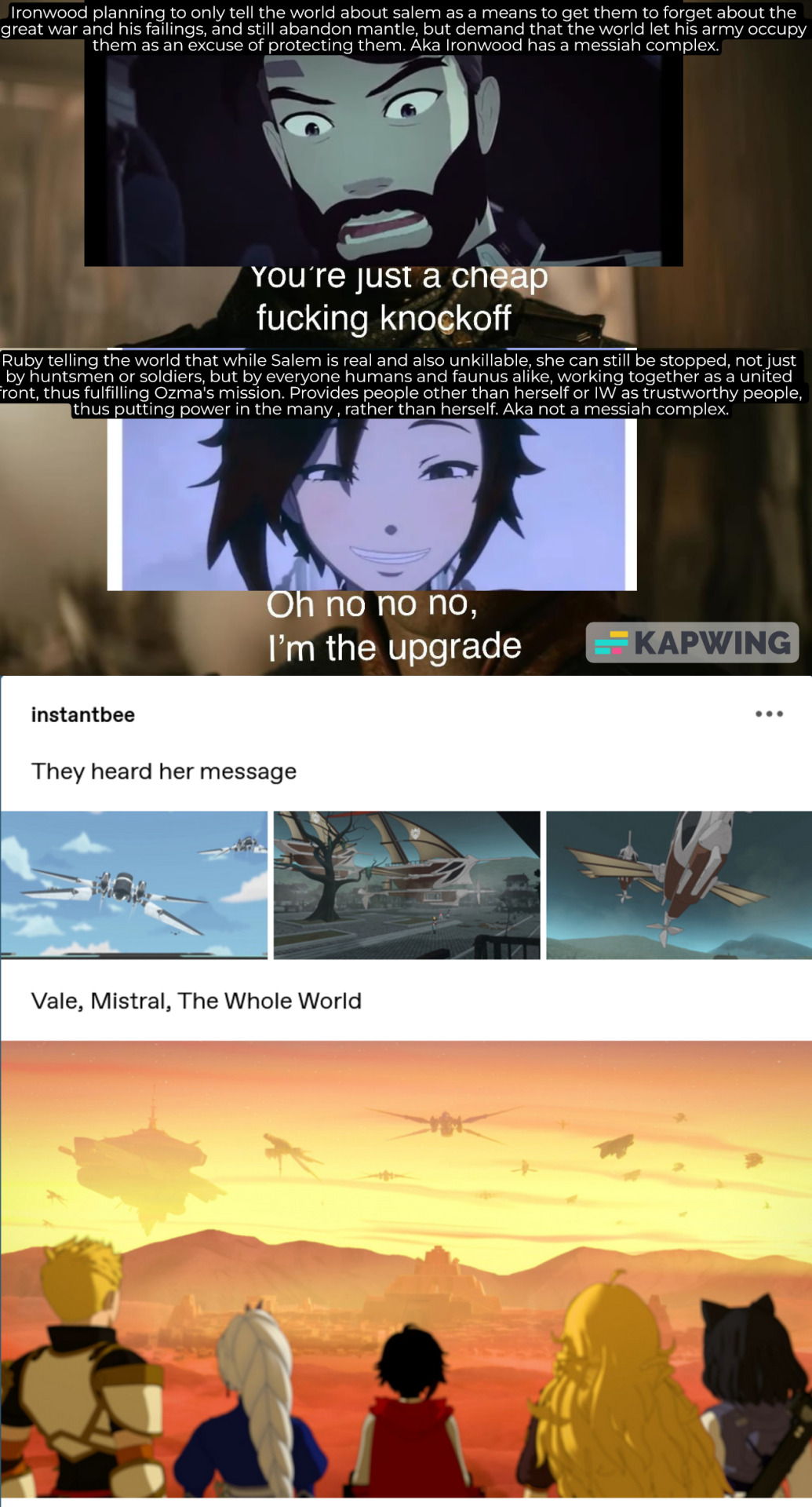
Remember how people claimed that team rwby had no plan, that ironwood was the real hero, and that ruby somehow had a messiah complex?
The Finale of V9 basically showed every Ironwood Simp that Ruby’s plan worked!
Team RWBY made the right call, and Ironwood failed.
Somebody pick up that phone, because I FUCKING CALLED IT!
@instantbee thanks for the screenshot!
#GREENLIGHTVOLUME10
#james ironwood#general ironwood#rwby#rwby volume 9#rwby volume 8#Team RWBY#rwby meta#rwby analysis#rwby discussion#ironwood#rwby ruby#rwby ruby rose#ruby rose#GREENLIGHTVOLUME10
576 notes
·
View notes
Text
I’ve seen a lot of people talking about how the exorcists look like demons, and while I do understand where the complaint is coming from I also wanted to talk about how them looking like that kind of supports the narrative.
I’m going to start this off by staying this is from a perspective looking at the narrative presented to us in the Hellaverse, not any specific religion because 1) I am an atheist who doesn’t have the knowledge or background for making any calls on that and 2) the canon hasn’t confirmed this adheres to a specific belief system. There’s Adam and Eve and Hell and Heaven and yes, but this show arguably works as a parody of all of that.
Now that that’s established, I want to bring up one of the main points in the show: the idea that those in Heaven and Hell aren’t that different. In Helluva we’re shown the experiences of hell-born, and we even see cherubs later on who seem to fulfill the parallel role of them in Heaven (with the IMP vs CHERUB fight.) We also know that Lucifer was an angel in this canon. So some of the characters with the most authority in those domains are from the same stock.
The main difference seems to be punishment. Lucifer was punished for his actions and was given those who were deemed “Sinners.” The Hell born seem to be just natives living there and many seem to be products of their environment. So while Sinners may be “bad” and Winners “good”, all those born in Heaven or Hell have no reason for being there.
Whether exorcists are brought to heaven or made there, there is still that view of superiority. The way Lute talks makes it clear she’d be willing to kill the hellborn if she could, despite them not having done anything to be there like the Sinners. It’s similar to how some people born into high economic status view those born into lower. It’s just luck of the draw but now you have access to different opportunities and that influences the way you view others. Those born in Heaven probably look at those born in Hell and argue that if hellborn aren’t bad, then why does Hell suck? Ignoring the fact that Hell is established for the purpose of containing Sinners, who often end up being more powerful that the majority of hellborn.
Even some of the Sinners likely fall into that issue where people who gave to endure harsher environments may have to resort to more extreme measures to get by, and then punishment for it just causes them to need to do even more because their conditions worsened. As seen with the rate of people who keep returning to prison. With Hell some may have fallen down this path (think of Angel, who was born into a crime family, it’s likely a lot easier to fall into drug addiction then when you have access and more things you’d like to forget, but drug addiction can be a slippery slope and the other stuff he needed to do to survive basically condemned him.) Obviously not all Sinners fall into this category and are just monstrous pieces of shit, but they likely isn’t the case for everyone.
Then, once you get to Hell it’s essentially a larger prison, except you aren’t separated and are given powers, causing some of the more malicious individuals to rise up and acquire power, making it even more of a nightmare for everyone else. This continues that cycle of having to do certain things to survive. Similar to have in jail that fear of getting hurt by some violent people make you align yourself with slightly less violent people. Except now in Hell there’s that added issue: there’s no escape.
(Also, Hell is a prison but you STILL have to pay rent and work to survive, so you really get the added stress of both worlds.)
Anyway, this whole cycle causes a similar effect to the growing class disparity we see in many countries. Those on top (Heaven) continue to have power while those lower have to deal with most of the burden. Reinforcing that belief in exorcists that Heaven is “good” and Hell is “bad” because they are unable to see the full picture. They just see it as “they blew their shot” without thinking of why that may be or considering the people who didn’t even have a choice being there— like how some people blame others in poverty for being that way because “they are lazy.” That’s not even remotely the full picture. But because certain things come easy for you it’s hard to understand why it can’t come easy for others.
Exorcists are then given the excuse and opportunity to kill others, people who they believe are lesser than them. And some take genuine joy out of it, yet they continue to see themselves as the “good guys” because that’s what they are and the others “deserve it.” And this shows how when some people are given the opportunity and reason to be assholes they’ll take it- millionaires don’t HAVE to exploit their employees, but they view it as being to their benefit and helping the bottom line.
So now, both exorcists and those in hell have reason and excuse to be violent, albeit for very different reasons. Yet because of this exorcists are still “good” and those in hell are “bad.” And this is largely because of the lack of consequences for their actions. Heaven reinforces their behavior, before episode 8 there was no push back from Hell, so they could continue to use their reasoning as an excuse to kill others.
They’re blind and don’t see it though. They only see the world from one perspective, which is ironic given the exorcist mask is missing an eye. They can put masks on and hurt others and then take them off without dealing with the consequences. They “go down” to the level of the very people they despise and then write it all off, because they have the comfort of taking their masks off at the end. Of having a choice.
It’s also interesting how their masks don’t resemble sinners but Hellborn. Which almost reminds me of mocking another’s culture while actively hurting them. They may not be able to physically hurt hellborn, but they’re still viewed through the same lens as Sinners. They’re still “bad.” So exorcists can don caricatures of their appearances, go around “pretending” to be them by committing violent acts, and when they’re done they can take it off. As I’m writing this I’m now thinking about how in the past black-face has been used to reinforce racist stereotypes, making racist caricatures.
This also camouflage in a way, maybe they were previously asked to “fit in” before things got all crazy, and when told to look for “demon disguises” they all fall back onto the stereotype and dressed up like that.
The usage of exorcists wearing demon-looking masks could be them both “playing bad” while also clearly showing the fact that at the core people aren’t so different. For as much as they hate those in hell, they’re just as likely to fall into the same traps and patterns as them.
Having written this all now, I wanted to bring up Vaggie. Vaggie who took her exorcist mask off to show sympathy for someone only to be punished and marked with an “X” that mirrors her mask. Vaggie who previously was part of the “elite”, where she could forgo consequences until she couldn’t for not following them and was cast out, being permanently marked. Vaggie, who was previously allowed given the gift to “play bad” due to being in Heaven, but when she was cast out “playing bad” wasn’t an option anymore. Taking off her mask can’t get rid of mistakes anymore, and now she has to display them for the world to see.
I don’t know if the “X” was intentional on her part or irony, but if she did choose it it could also be her recognizing her role in the system. Her realizing she can’t go back and using the “X” to remind her of what she’s done. Because she doesn’t have the luxury of pretending she’s a good person anymore— she doesn’t want to forget.
#if anyone wants out more knowledge on social issues wants to add anything feel free#I’m just using what I know from sociology classes as well as other classes discussing social inequalities#long rant but I got thinking and then thinking and thinking#and I was taking a bath cause sick and this got longer and longer#hazbin hotel#hazbin hotel theory#hazbin hotel meta#class disparity#inequality#exorcists hazbin hotel#lute hazbin hotel#vaggie#vaggie hazbin hotel#racism#social inequality#sociology#hazbin analysis#hazbin hotel analysis#hazbin meta#hazbin theory
77 notes
·
View notes
Text
Okay so I watched Inside Man on Netflix. It's interesting. More importantly, it's a masterclass in crafting likeable characters and how the POV we follow in a scene affects the way we see a character. Also, this somehow relates to the Star Wars Prequels, I promise! 😆
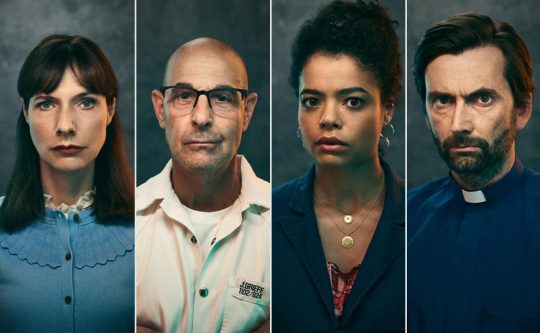
The moral of the series is that "everyone is a murderer, all it takes is a good reason and a bad day." The main characters are:
A vicar who - through a huge misunderstanding - has now locked his son's tutor in his basement and doesn't know how to get out of this situation, played by David Tennant.
A convicted murderer and ex-criminal psychology professor who solves crimes from his cell, as he waits for his execution, played by Stanley Tucci.
So a man who locked a woman in his cellar and a guy who murdered his wife. In any other movie, these guys are the villains. Yet, both of these characters are extremely likeable!
This is achieved through how relatably they behave in their relationships (kind, humble, humorous)...

... and through the emotion and/or charisma brought by the actors playing them (it's THE DOCTOR/CROWLEY and Stanley Friggin' Tucci)... but also through the amount of screen time they get.
We're with them for most of the show. There's other characters (the journalist, the trapped tutor and the vicar's wife) and subplots, of course, but they're our two anchors.
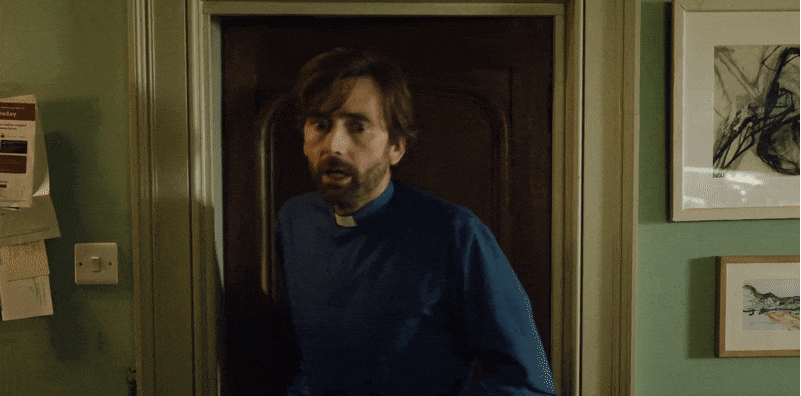
So when I'm watching David Tennant lock his son's tutor in his cellar and consider if he should free her - only to see him and his wife make things worse - I'm not thinking "you monster" like I do when I see Buffalo Bill in Silence of the Lambs for example.
No, I'm thinking "goddammit vicar you're making things worse, it'll come back to haunt you, there's still a chance to turn back, please!" I'm rooting for him to make the right choice because I'm seeing him struggle and despair and hesitate throughout many scenes.

When I'm watching Stanley Tucci guiltily say he deserves death, after being so darn charming, humble and in clear possession of a moral compass, my instinct as a viewer isn't to go "he's right".
It's to go "aaaw, no it's fine, everyone makes mistakes."
And these characters remain likeable and/or relatable for a huge chunk of time... until, every once in a while, the show reminds you that, "remember, these guys are criminals."
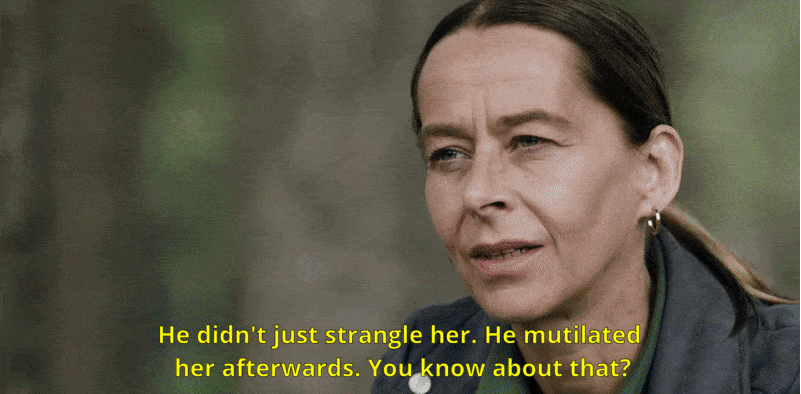
"One of them's killed his wife then decapitated her, and the other one is contemplating murder, so they did/are doing evil stuff, they're the villains and you shouldn't grow fond of them."
Then it goes back to making you empathize with them again.
It's quite the emotional roller-coaster, very intriguing yet frustrating, which I have to guess is exactly what the show is going for.
But the point is: the amount of time we spend with these characters is partially what elicits this emotional reaction out of us.
If we consider the tutor's character:
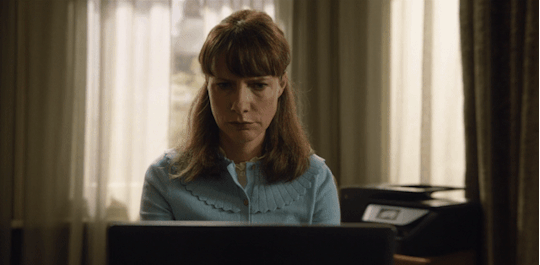
For all intents and purposes, we should feel sorry for her, or full-on fucking love her. Objectively-speaking, she's:
smart but obviously scared,
we establish early on that she has a brave heart and stands up for oppressed women,
she thinks she's trapped by a pedophile or a man defending a pedophile, figures he'll inevitably try to murder her, yet manages to stay resourceful, determined and cool-headed despite it all.
She's an absolute superhero.
But that's not how the narrative frames her.
She's framed as an antagonistic force, in the vicar's subplot.
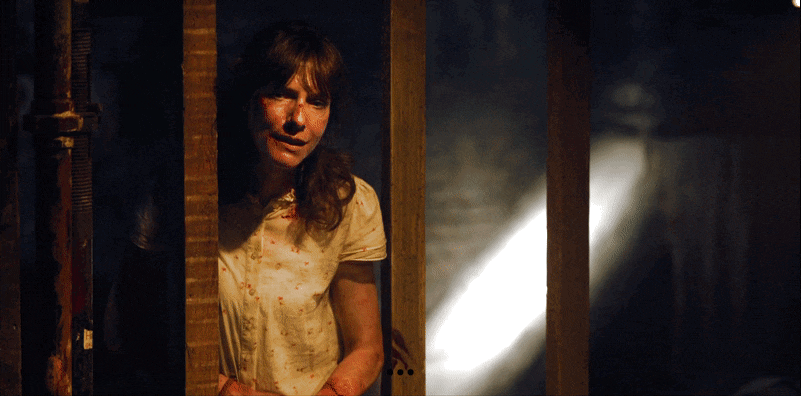
She may be the one tied up in a basement, but she's in control and the vicar is not. She's almost framed as being in a position of power (when she's really not), which leads the audience to view Tenant's vicar as an underdog.
When the vicar is trying to look for alternatives to end this situation so that he doesn't have to kill her, she's unhelpful,
and even starts pitting the vicar and his wife against each other.
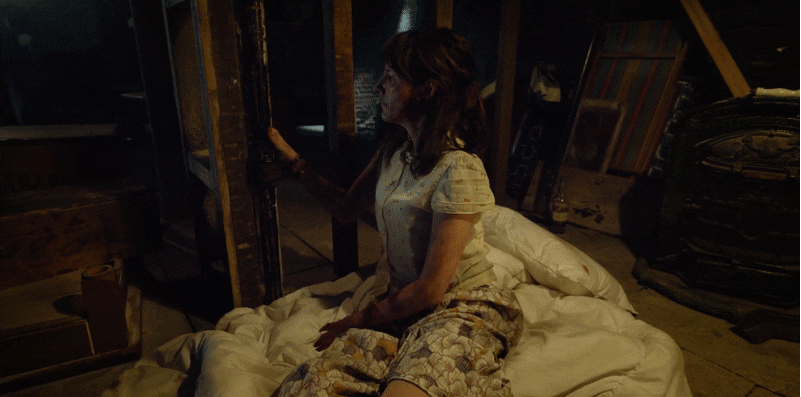
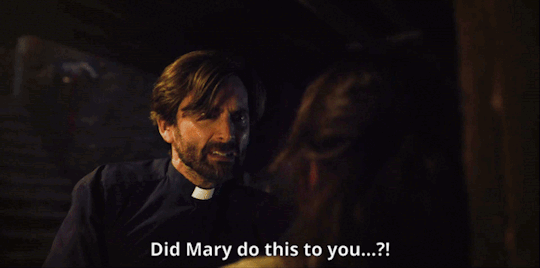
Again, in-universe, she's scared shitless and in "fight-or-flight" mode. She's putting up a front because she's just trying to get outta this alive. She's the victim, here, not the vicar who captured her.
But as a viewer, you don't feel that, despite objectively knowing that. Why and how?
Because we barely see this character, compared to Tenant's vicar. So we have more time to grow to feel for him. There's "why".
Also 90% of what we do see of the tutor is her being aggressive, manipulative, sometimes downright merciless and we're seeing her from the POV of the vicar or the vicar's wife. There's "how".
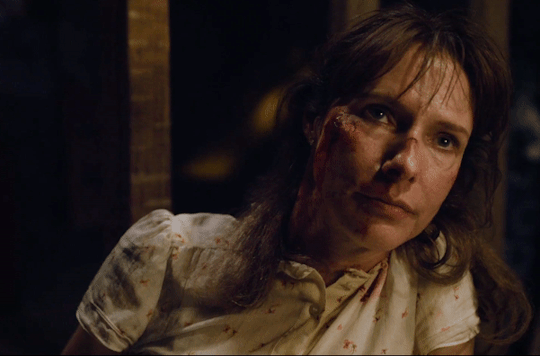
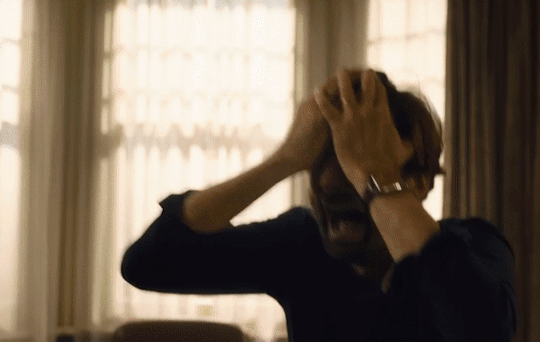
Result: the viewer feels sorry for the captor and frustrated towards the captive.
This isn't a rational reaction, it's an emotional one (the goal of any visual artform being to get an emotional reaction out of the viewer).
Which means the series and Stephen Moffat effectively did their job.
How does this relate to the Prequels?
Well, a lot of people see the Jedi in a negative light in the Prequels, and Anakin in a more sympathetic one.
Even though the Prequels are about how a good man becomes bad, and even though the Jedi embody one of the major Star Wars themes (selflesness) as opposed to Anakin who clearly displays the anti-theme (selfish)... a majority of fans feels more for the latter than the former. Why?
Because the Prequels unintentionally do what Inside Man does purposefully. You react to Anakin like you react to the vicar. You react to the Jedi like you react to the tutor.
Simply put: Anakin has more screen time than the Jedi.
And we don't just see him more, we see him struggle, we see him about what he knows to be morally right vs what he really wants, we see him be overtaken by his own fear...

... and just by contrast, that makes him more relatable than the Jedi, who have already overcome their character arcs and mostly all learned to keep their flaws in check.
The narrative doesn't intend to frame them as antagonistic. We do see them talk about how worried they are, we do see them emote.

And if you think about it, it's easy to see why:
their entire way of life is going to crap,
their values are being corrupted as they're forced to fight and die, alongside their clone brothers, in a war they wanted no part of,
they sense that the Force is close to the breaking point and that the galaxy's inhabitants are suffering on the daily.
But, for example, when Mace or Ki-Adi Mundi are shown expressing concern in the Prequels... as worried as they are, in-universe... out-of-universe, their measured reactions doesn't emotionally impact a viewer as much as Anakin's intense ones do.




So a big chunk of the audience will sympathize more with him than them. But like the tutor in Inside Man, the Jedi are objectively the victims and Anakin is objectively an unstable space-nazi who betrayed and destroyed them.
Just because we're not shown these characters be worried beyond just monotonously saying "I'm worried" doesn't mean they're not actually worried as Anakin is in Revenge of the Sith (if not more).
However we don't see it.
Because these three films aren't about the Jedi Order, they're about the Republic and about Anakin and about how each of these two beautiful things were corrupted (by Palpatine and by themselves) into becoming the very thing they stood against.
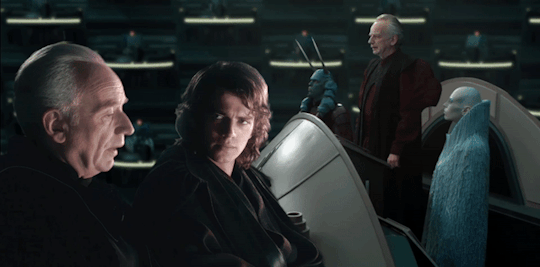

The Jedi aren't a factor in either of those two themes set up by George Lucas.
They became a factor when fans - who despite not liking the Prequels, still admirably chose to engage with the material - made the Jedi be more important to the narrative of the Prequels by re-framing these films as "The Failure of the Jedi".
Now, should Lucas have recognized that most fans wouldn't give two shits about why a Republic falls or the "matinee serial" format, and would've rather he focused on the Jedi, and developed them accordingly? Probably.
But good luck telling an indie filmmaker with a bunch of money how to tell the story he wants to tell.
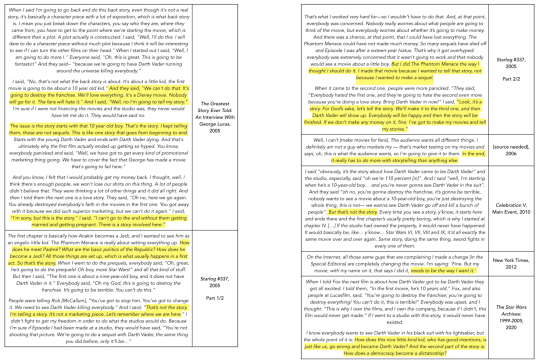
Could Lucas have done more with the Prequels to highlight the fact that the Jedi are the underdogs of the story, not Anakin's oppressors? Yes.
But, firstly, he probably didn't think that was a point that needed explaining. And secondly, as he explained at Cannes, in 2002, feature films are a very limiting format to tell a story, especially one of the Prequels' scale. If it doesn't directly contribute to the story you're telling... it's gotta go.
A limited show would've been better to cover every aspect of the Prequels more in detail and avoid confusing the audience re: who they should be rooting for.
Which is why it's interesting, to me, that Stephen Moffat used his limited show to INTENTIONALLY confuse the audience! 😃
#the screenwriter part of me was geeking out and I had to write this#one of my longest posts and it's about Inside Man of all things wtf#long post#discussion#star wars analysis#meta#SW Meta#Inside Man#inside man bbc#David Tenant#Hayden Christensen#harry watling#Anakin Skywalker#stephen moffat#george lucas#Jedi Order#Jedi Council#Mace Windu#star wars#revenge of the sith#star wars prequels#media#Netflix#BBC#dolly wells
574 notes
·
View notes
Text
i want to talk about randall tier
hannibal draws a lot of inspiration from manhunter (1986), which was the first film adaptation of the hannibal books, and i want to talk specifically about the scene where randall crashes through will's window, because it derives from a scene in manhunter. i am going to compare these two scenes, and use this to further my discussion of hannibal, which will be the focus of this. (there is a TLDR at the end of this!)

in manhunter, at the end of the movie, will runs and crashes through dolarhyde's window, shattering it and directly jumping into a fight with him. now, there is a copious amount of imagery in manhunter depicting will talking to his reflection in glass, windows, etc as if his reflection is dolarhyde. we get the sense that dolarhyde is inside of will’s head, and they start to blur as will has to relate and empathize more and more with dolarhyde to catch him.
will crashing through the window is him meeting the darkest parts of himself face-to-face – now, he and dolarhyde are on the same side of the glass. will kills dolarhyde, which represents will overcoming (or, at least, suppressing) his violent urges and the turmoil that comes with understanding killers so deeply.
so, will crashing through the glass to meet dolarhyde is him meeting the ‘bad’ part of himself, the part that understands killers and lets them inside of his head, and by killing dolarhyde, he defeats this darker part of himself. will graham, in typical 80s fashion, ends the movie stable in his morality and can return to his heterosexual family life and watch the sunset with his wife and child.
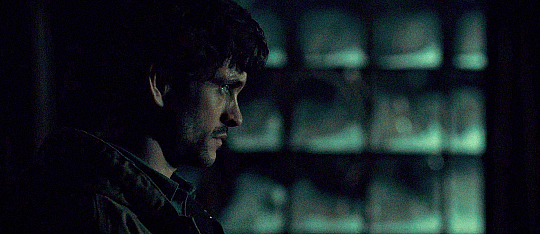
the scene in hannibal is a bit different. instead of the identity parallel being between will and dolarhyde, it is between will and randall tier. randall is (if i am not mistaken) the first patient of hannibal’s we meet that has undergone his “therapy” and is considered a success. this is when we fully start to grasp what it is that hannibal does with his “therapy.” and what will could Become if he accepted hannibal's guidance.
instead of solely will’s violent urges, like dolarhyde represented in manhunter, randall tier represents, in a way, what will could be: a 'balanced' person who embraces his violence and becomes one with it. randall tier has the same violent urges and the dissonance in his identity that will has, but he accepts it, embraces it, and revels in what he is.

so, when randall crashing through will’s window, will not only comes face to face with himself, but the Higher Self that hannibal is guiding him to Become. this is why randall is depicted as the raven stag, and then the stag man: will is forced to come face to face with who hannibal is guiding him to be, hannibal's influence, and has to confront how to handle his violent urges once again by being forced to kill in self defense. however, his fight with randall does not represent him overcoming these violent urges, as was in manhunter. the fight does actually facilitate will’s Becoming. will throws his shotgun away and chooses to use his hands to kill randall, as hannibal suggested. through Will’s fight with and murder of randall tier, he actually becomes closer to his Higher Self and his Becoming.
this is furthered by will's choice to make randall tier into a tableau. will’s first tableau. in will’s pendulum conversation with randall, it is made even clearer: will says “you forced me to kill you” and randall replies “i didn’t force you to enjoy it.” !!!!!
TLDR: in manhunter, will crashes through the window to meet a man who represents the darkest parts of himself. by killing dolarhyde, will defeats this dark part of himself and fortifies his sense of morality. hannibal flips this completely around. in hannibal, randall crashes through will’s window. will comes face to face with him, who, in a sense, represents his Higher Self and who will could be if he accepted hannibal's guidance. his fight with randall marks the start of him beginning to embrace this intimate violence hannibal has been talking about. by killing and displaying randall in a tableau, will revels in his violent urges by killing him with his hands and enjoying it and becomes closer to his Higher Self and his Becoming. instead of will overcoming his violent urges through this fight between a him and a representation of his violence like in manhunter, will killing randall fuels these urges.
#i feel like it is quite obvious that will was lifted closer to his becoming by killing randall#so i know this isnt really anything groundbreaking#but i really really wanted to compare the window crashing scenes#and how hannibal differs from its source material and the adaptations it drew inspiration from!#comparing them can highlight aspects of the plot that otherwise might not be considered in this way#i hope if nothing else my discussion of parallels & symbolism was insightful :]#pluto analyzes#nbc hannibal#hannibal lecter#hannibal#will graham#hannigram#mine#hannibal meta#hannibal analysis#shiizakana#naka choko#hannibal 2x09#hannibal 2x10#francis dolarhyde#randall tier
786 notes
·
View notes
Text
The Glory: my thoughts so far

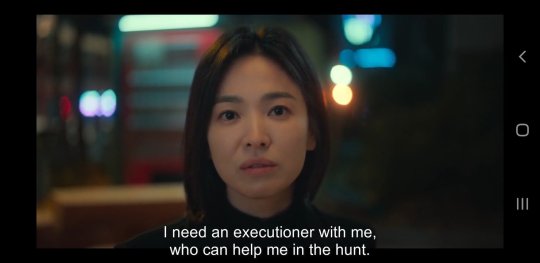
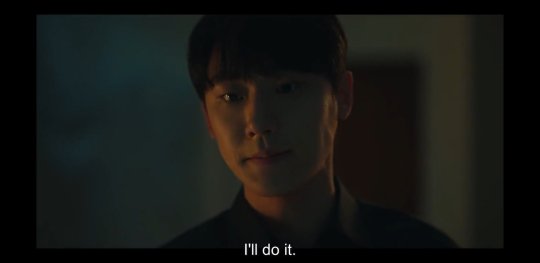
Broke: I love you.
Woke: I will k1ll for you.
So I'm watching this show called "The Glory" it's about a girl named Moon Dong Eun who's plotting to get revenge on her high school classmates and teacher who bullied her, and by bullying I mean (extremely violent mental and physical abuse, which left her body disfigured, and her life ruined)
And I gotta say, THE REVENGE PLOT IN THIS SHOW IS REALLY SATISFYING SO FAR
There's already so much media that vilifies bully victims, so SEEING A BULLY VICTIM AS THE MAIN CHARACTER THAT WE ARE ROOTING FOR IS SO REFRESHING.
I haven't watched that many kdramas but this is also the reason why I appreciated Gangnam Beauty, bc just like The Glory, both the female leads are
not vilified by the narrative for their unconventional choices, (Kang Mi-rae for her plastic surgery and now Moon Dong Eun for her revenge). In The Glory, the the trauma Dong Eun had to endure while being abused by her classmates and teacher was portrayed in a very sympathetic light, and the story instead pins the blame on the people and the circumstances that led her to make those choices. Not to mention her bullies live good lives but continue to be terrible people with NO REMORSE for their actions even in adulthood, so while Dong Eun's revenge is still morally questionable, it is also VERY understandable.
Another thing I LOVE is how realistic Dong Eun's revenge plot is executed. The show and the Dong Eun herself is aware of the disadvantages she has (with the laws and all) and so she carefully executes her revenge in the way that she doesn't have to get her hands dirty. WHICH MAKES THE REVENGE TO THESE TERRIBLE PEOPLE ALL THE MORE SATISFYING! Remember that teacher who abused her? Yeah, She orchestrated his son to kill him, by simply confessing what the teacher did to her (bc she knows how much their family values reputation) HONESTLY QUEEN, LOVE THAT FOR HER! (also the irony that she also became a teacher like him except better, and is actually kind to her students)
And this show isn't exactly the usual "ReVENGe is BAd!! DOn't throw away your life for reVEnge!!" In fact, most of Dong Eun's allies actually support her because they understand just how evil her former highschool bullies are that they needed to be punished.
Which leads to the scene with Dong Eun and her love interest Ju Yeo-jeong. When she first confessed how she was planning revenge against her bullies, Yeo-jeong thought it was just some light bullying, until she undressed and showed the disfigured scars littered across her body. Yeo-jeong being a doctor, saw her scars and understood how much she suffered that he wept. He went from telling her not to pursue revenge to declared that he is willing to be her accomplish hence this scene.
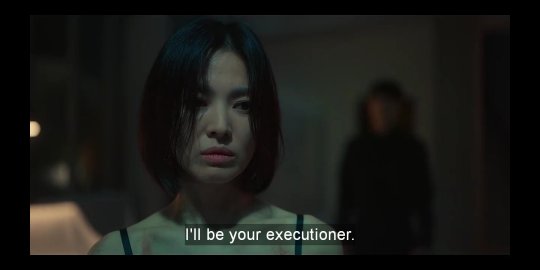
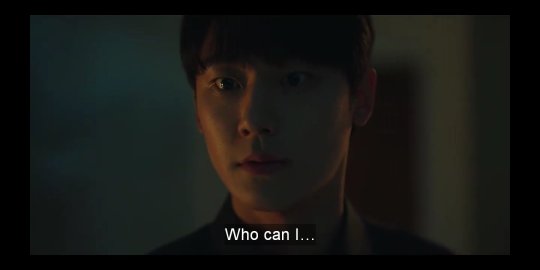
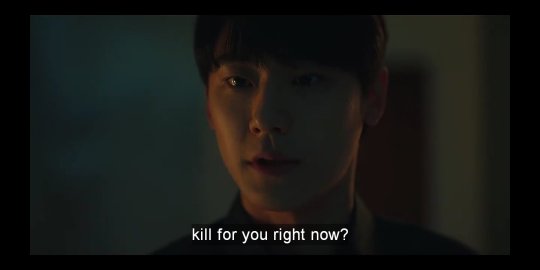

MURDEROUS VENGEFUL COUPLE, Love that for them. They probably won't come out of this unscathed, but I really want them to WIN and get a happy ending, idk if that's too much to ask for. 😩😩😩😩
#The glory#kdrama#THIS IS WHY I HAVE UNREALISTIC EXPECATIONS WITH MEN JKJK#spoilers#me speaks#meta#analysis#i guess#lee do hyun#song hye kyo#netflix#also sorry for the massive word dump but I haven't seen much discussion for this show yet#so someones gotta do it LOL
612 notes
·
View notes
Text
Thinking about Last Twilight again and the connection between Day and action.
Here is a man who is a professional athlete, whose entire life was dedicated to movement. He would have had to exercise every day, cardio, weights, resistance training, the lot. On top of that, he would also have been training his specific badminton skills for several hours a day. His meals would have planned for maximum energy and vitality. It's almost impossible to overestimate just how much Day's every waking (and also non-waking, healthy sleep schedules are essential for good energy after all) moment was dedicated to high-level activity.
And then The Incident happens.
In an instant, his vision becomes so massively impaired that he is now almost functionally blind. Not only does that rob him of a huge amount of independence, it also steals his movement. Not because he can't move but because the people around him (and perhaps even a little bit himself) become worried about him moving. Action becomes something to be feared.
I think it's not for nothing that when we as an audience and Mork first see Day post-incident, his is sat in a wheelchair and because of that we know he is unable to walk.
(Now, that's not to say wheelchairs suggest a curtailment of freedom because, for their users, wheelchairs are freedom. Without them, they truly would be stuck. However, they do signal to the audience that the user's walking ability is impaired somehow. Additionally, it's worth mentioning that @my-rose-tinted-glasses already pointed out that Day-in-the-wheelchair is likely an homage to the French film The Intouchables. I also like to think that there's perhaps there's a small nod here to Day's determination to be independent. He can't walk but he can still move and, damn it, he's still gonna go to those interviews.)

So, Day, at the moment he meets Mork, is at his least mobile. His career in movement has been shattered and now he can't even feed himself without injury. It is this that has likely forced him to accept that he could do with some day-to-day assistance.
Throughout the episode we then see the little ways that Day tries to take back his mobility but is stopped by his family and his own disability, culminating in the climatic road scene where he is saved by Mork.
But we also see little moments where he succeeds in his independence. He makes it from the car to the lift, he identifies the button he needs to press, he finds the library and is able to locate someone to guide him to the CDs (of audiobooks/music?). All the while, Mork is watching him, assessing him, seeing what he can do and what he can't, not running in before he has a chance to try. And that then ends with Mork calling Day up, asking him to cross the room on his own to get his library card.
So we start with a stationary Day, who is still determined to have independence but is hindered by his situation, and we end with a Day taking the first steps on the journey of seizing back his freedom to act.
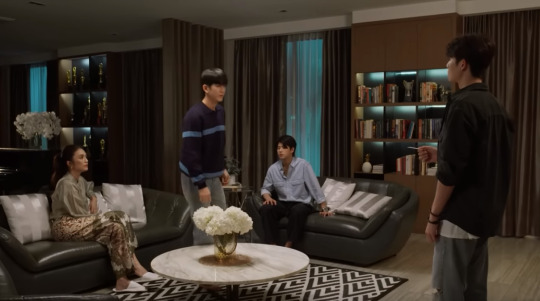
#It's also interesting that we start with Day sitting with his family. Although he is slightly apart from them#he is still on their side#so to speak. Whereas in this final frame we see him standing and moving away from them#forming a new 'side' with Mork.#but that's another analysis for another post perhaps haha#along with the discussion of day with glasses vs without glasses in his first meeting with Mork#if i ever get the time haha#last twilight#last twilight the series#morkday#mohkday#last twilight meta
78 notes
·
View notes
Text
Doctor who hot take incoming. A lot of people are like, “Doctor who has always been left where the heck did all these conservative complainers come from? I bet they’re fake fans,” and while I do understand this sentiment, I also think new who does have a more conservative bent in some areas than classic. This is an American perspective so take it with a grain of salt.
In s2’s tooth and claw, the Doctor and Rose, with help from Queen Victoria herself, fight a werewolf in one of the queen’s castles in Scotland and the Koh-i-Noor diamond saves the day.


Meanwhile in classic who s16’s the Pirate Planet, the Doctor, Romana, and K9 find a planet that travels across the universe pillaging and capturing other worlds all to prop up/extend a nearly dead queen’s life and increase her power. They save the day by destroying the bridge, as in what is controlling and allowing the planet to move like this, and the queen herself.
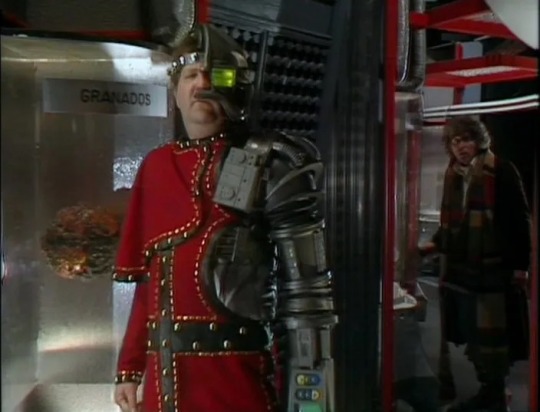

In new who, the spoils of colonialism and imperialism save the day.
In classic who, destroying the mechanisms of colonialism and imperialism saves the day.
I’m not saying this was an intentional shift. But it is noticeable and why I think some conservatives have gravitated towards New Who specifically.
And I realize the counter argument is that this is s2, there are 11 other seasons you can look at where they grew past this. But based on what I’ve seen so far I’m honestly not sure about that. (I just finished Hellbent) But that’s a whole other argument that can be saved for another time. My point is that in new who’s most popular era, the 10th Doctor, this is the subtext, intentional or not. And I am not trying to say classic who is some bastion of leftism. My point is more there is a nationalist bent in new who. So it’s not a stretch to see why it’s got conservative fans.
#doctor who#classic who#classic doctor who#new who#nuwho#Doctor who discussion#hot take#Doctor who analysis#I could also bring up the christmas invasions ending but I’ll leave it here cuz that’ll turn into a whole other thing#the pirate planet#tooth and claw#doctor who meta
85 notes
·
View notes
Text
There is something so interesting about Orym having an idea that Laudna killing Bor'dor could bring Delilah back when you look at it in comparison to his character in EXU.
EXU Orym threatened Dorian because of the chance that, if things went sour, Dorian might put on the crown and get involved with this betrayer god. He saw the effects it was having on his friend and thought 'you will throw yourself on the fire to keep us warm and I need to step in to stop that'.
Current Orym sees his friend drawing on dark magics, the powers of a woman who has tormented her for years, who she fears, and when she herself is slipping to such a dark place and ready to kill someone, he nods. 'This is war' he says. 'We may need this' he thinks.
Because the first time he dealt with the Ruby Vaguard, they killed his father and husband. The second time they killed him, Fearne and Laudna. The last time they faced them, they succeeded in their plan to help bring the end of the gods and nearly killed his leader. I imagine he isn't feeling too optimistic about the next confrontation. Hes exhausted and probably scared and so when he hears that this guy is lying to them, that he is with the people who has done this to them, Bor'dor has to die. He is a threat and needs to be dealt with. He is a very different person to who he was at the start of this journey.
Laudna, already in a dark place after everything, now betrayed once again, possibly taps into Delilah knowing the conseqences but goes for it anyways. Who knows if she even could have been stopped. But she acts first and there is no one there to draw a sword and tell her to put the crown down.
#i will write a meta about laudna later but i was thinking about exu again after they talked about it on 4sd#i thought imogen would be the dorian parallel but its laudna instead#and its not 1:1 i know#critical role#cr spoilers#cr3#orym#orym of the air ashari#if anyone has an issue with my wording or analysis please feel free to discuss in the replies#i dont wanna see any vague posts in the tags about this#thanks
149 notes
·
View notes
Note
Can I ask your opinion on answer to this : https://www.tumblr.com/gojuo/742796780522061824/is-satosugu-a-queerbaiting-ship?source=share ?
for reference, this is the post anon is talking about. feel free to check it out for context before reading my response.
this person is basically saying that stsg cannot be romantic because there is no romance depicted between them onscreen; all of their interactions are meant to be regarded through a platonic lens because it's never explicitly indicated (in canon) to do otherwise.
this goes back to the whole idea of "projecting" queerness onto geto and gojo despite them being queered already, which i've touched on before. i'm going to respond to this person's ideas in two main parts: 1) queerbaiting and 2) canon, alongside the idea of "shipping".
as an idea, queerbaiting refers to the marketing technique employed by creators and publishers to increase a media's appeal, achieved through teasing a queer connection between two characters romantically unentangled in canon. queerbaiting dangles the proverbial carrot in front of the audience only to snatch it back with forced love interests or open declarations of brotherhood. it operates along the binary of friends/heterosexuals and queered/romance, dangling the carrot in front of the latter only to resolutely plant their feet in the former.
shockingly, i actually agree with this person— gojo and geto are not queerbaiting because they are queer-coded. the blatant difference between baiting and coding is that the former uses the appeal of fetishism as a marketing mechanism and the latter employs subtextual traits, literary devices and narratorial mechanisms that are recognizable as queer without being stated outright.
queerbaiting is always negative; it operates through stereotypes and functions to create the illusion of representation to ultimately reify the sex/gender binary. queercoding, on the other hand, functions in a more neutral space to create all forms of representation. (although western media has historically queercoded villains, which is an example of negative mechanization).
when engaging in discourse around queerbaiting, it's important to remember that queerness does not present uniformly across borders and time periods. when we seek open declarations of love as affirmations of queerness, we are seeking western representations of queerness, which are often founded in romantic love. the person who wrote this post is engaging in a solipsistic analysis from a western perspective, a perspective of which too often assumes the 'default' in anglophone fan spaces.
gojo and geto are not meant to be interpreted through a western lens because they are not borne of the west. applying a western conception of queerness to them as a barometer is unfair, incongruous and downright disrespectful to their characters. it's akin to shoving a box into a circular hole and declaring the box at fault for not being able to fit. simply because gojo and geto do not fit your static conception of queerness does not negate the core tenets of their characters that can only be understood through a queered lens, albeit a non-western one.
this brings me to my second point, which regards conceptions of canon and the practice of shipping. this person applies the same binary to fandom/canon spaces as they do sex/gender, dichotomizing jjk media into 'source' materials and 'fan-generated' content, much of which they relegate to the "stsg shippers [that] forc[e]their headcanons down your throat and manipulat[e] you into believing that shit".
a guiding principle amongst purists of any media is that there is "original" and "unbastardized" content, and then there are fan "mutilations" of said content that come after. they maintain a sanctimonious attitude and imply that people who engage in bastardizing media therefore understand the "source" content to a lesser degree (a requisite qualification to engage in mutilation).
in polarizing fan content and 'source' content, purists willfully blind themselves to the true essence of media— it does not exist independently of the imagination of the populous, it is made and continues to be made of the populous' imagination itself. once created, each re-imagination is not adjunct to the 'source' material but rather an extension of it on an equal ontological plane.
functioning less like an island in the ocean of our worldly milieu, media is more of a current, pushing and pulling on different sociocultural forces and being shaped by them in return. regarding it in a puritanical manner is a perversion of its nature because media does not merely live in the world, it becomes the world around it.
this person divorces so-called 'fan' content from 'original' material, and derisively declares that "Theories you read? That's fandom. Art you reblog? Fandom. Memes you consume and regurgitate? Fandom. Sending me asks about JJK? You're engaging in fandom". in doing this, they fundamentally do not understand that the two are inseparable because they are co-constitutive. jjk is fandom, and fandom is jjk.
fan culture is not supplemental to 'source' content; it a manifestation of media achieving its intended purpose, which is to join the world that bred it. fandom is perhaps the highest form of intellectual engagement with jjk because it executes the understanding that media exists within the world and not outside of it.
the things fans create are not inferior or antithetical to the 'source' media; however, i'm not saying that they're all inherently favourable either— they can be anything because they can just be. media invites itself into our world and in doing so, sends an amorphous invitation back. when you pompously declare that "in canon there is no romantic love between those two and there never has been", you slap the hand that extends itself to you and defy the maxim of media: it is not prescriptive, it is participatory.
when people acknowledge that gojo and geto are queercoded and choose to understand their coding in a romantic context, they are not "forc[ing] their headcanons and misinterpretations of the material down everyone's throats". they optimize media's purpose and reach back towards the waiting hand of fiction instead of isolating jjk and forcing it out of the creative medium that birthed it. "shipping" is one form of engagement amongst many, and is a reductive term that belies the intricate textual analysis required to arrive at its conclusion.
one key dimension of the "shipping" discourse is that it's mainly conducted by people who aren't men. men, in principle, are used to dominating every discursive space. to them, it is utterly flabbergasting that people who aren't them might have more insight into their favourite media than they do; nuanced and complex insight at that. compressing the discourse about stsg into "shipping" is reductive and disregards the complex conceptual and narrative analysis conducted to reach the so-called "shipping" conclusion, a practice which requires analytical capabilities that elude the men who deride them.
maybe the people who are "annoying as fuck" are not the "stsg shippers" but the people who insist on interacting with jjk in a purely prescriptive context, clinging to a vacuous relationship with their favourite media and removing themselves from its most authentic, intellectual and enjoyable facet in the process.
#my jjk thoughts#sorry for the long ass ramble i had many thoughts lmfao#ask#stsg#satosugu#jjk#jujutsu kaisen#satosugu analysis#satosugu meta#stsg brainrot#jujutsu kaisen analysis#jujutsu kaisen meta#queer discourse#lgbt discourse#fandom culture#fandom discourse#jjk fandom#gojo satoru#geto suguru#gojo x geto#satoru x suguru#satosugu brainrot#queer fiction#queer discussions#shipping discourse#shipping things#fan culture#queer media#queer jjk#queer jujutsu kaisen
44 notes
·
View notes